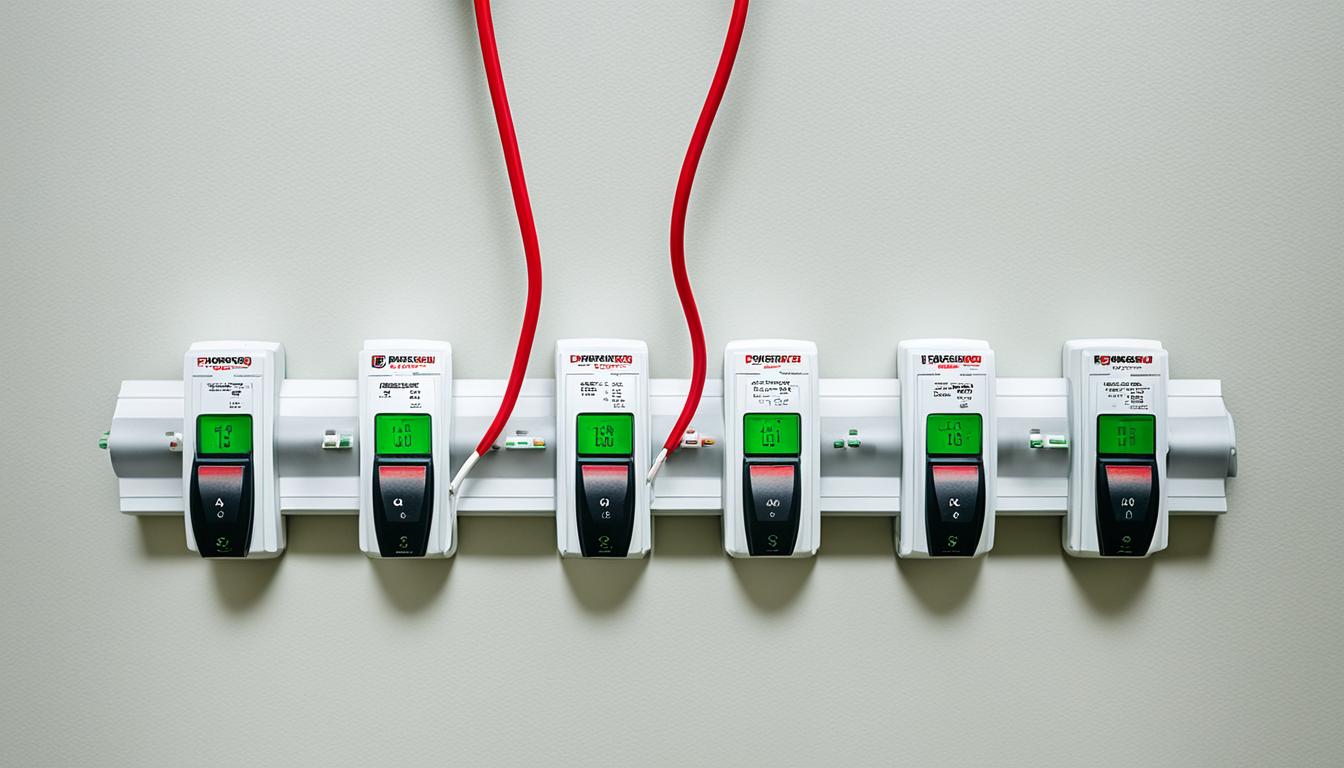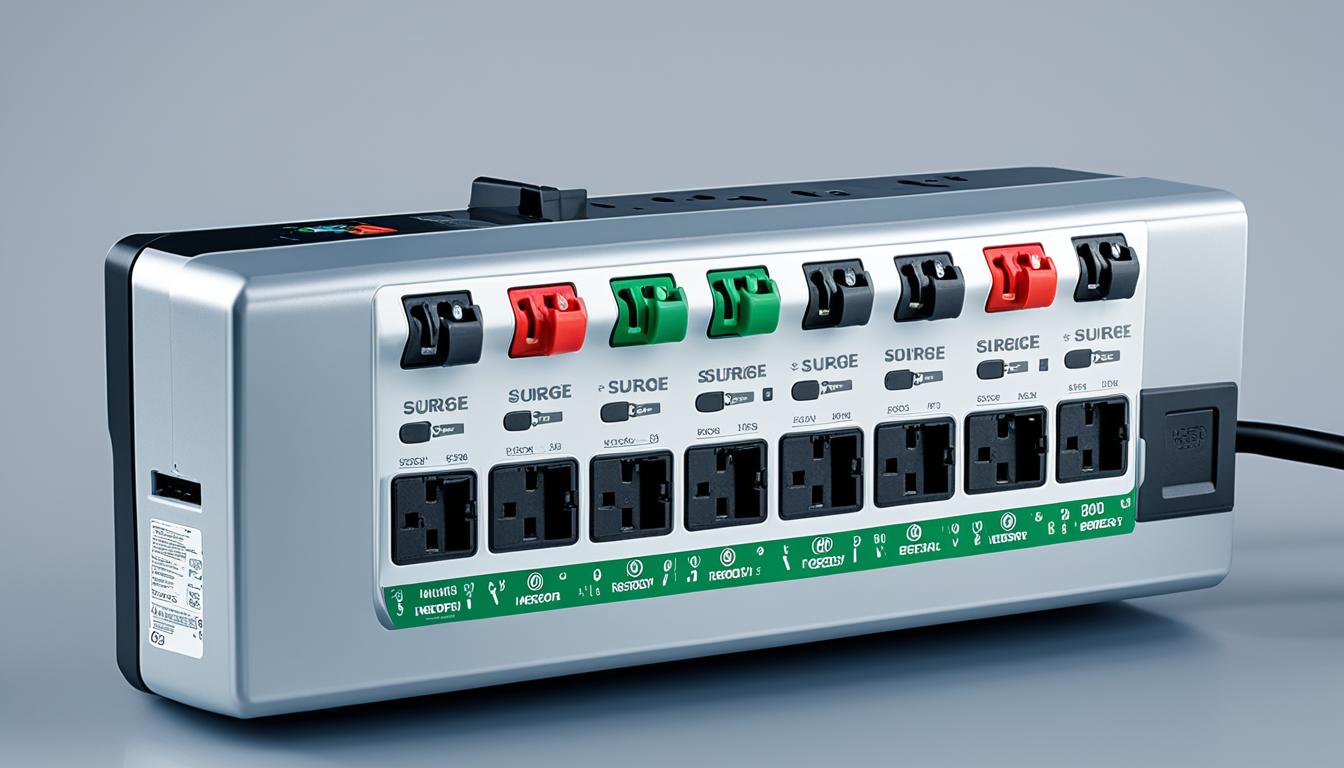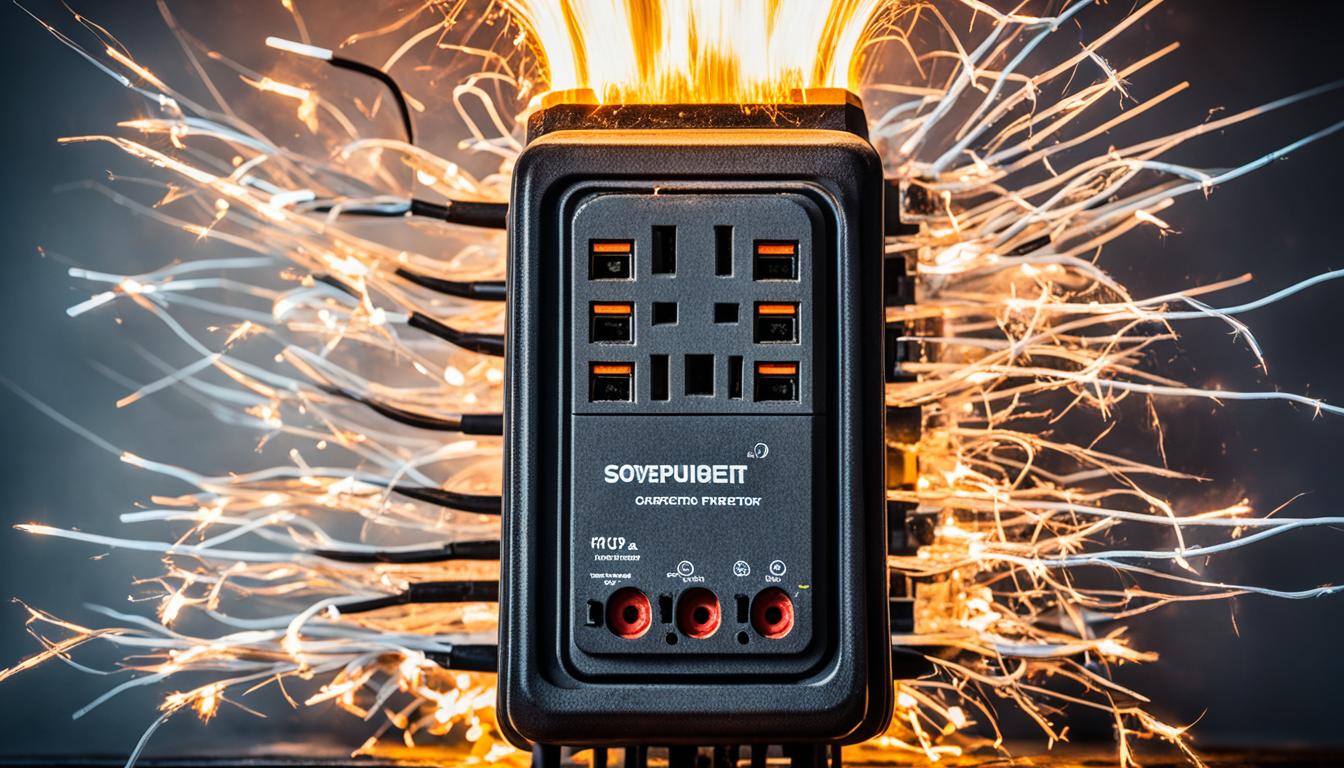When using a space heater to stay warm during the winter months, it is crucial to ensure that you are following safety guidelines and using the appropriate extension cord. Harper College emphasizes the importance of using UL, ETL, or CSA certified space heaters with automatic shut-off features and not leaving them unattended. They also advise against using space heaters to warm bedding or cook food. Additionally, it is essential to place space heaters at least 3 feet away from flammable materials and plug them directly into a wall outlet to prevent overheating and potential fires. The Electrical Safety Foundation International (ESFI) provides further guidance on space heater safety, including proper placement and avoiding the use of extension cords or power strips.
Key Takeaways:
- Use UL, ETL, or CSA certified space heaters with automatic shut-off features
- Avoid using space heaters to warm bedding or cook food
- Place space heaters at least 3 feet away from flammable materials
- Plug space heaters directly into a wall outlet
- Follow the Electrical Safety Foundation International (ESFI) guidelines
Choosing the Right Extension Cord for Your Space Heater
When it comes to using a space heater, safety should always be a top priority. And one crucial aspect of using a space heater safely is choosing the right extension cord. While it is generally recommended to avoid using extension cords with space heaters, we understand that there are situations where using one is unavoidable. In such cases, it is essential to select the best extension cord that can handle the power load from your space heater and ensure reliable performance.
According to the Electrical Safety Foundation International (ESFI), extension cords can pose fire risks and are not ideal for use with space heaters. However, if you find yourself needing an extension cord, there are certain criteria to consider. Look for extension cords with a high wattage rating, capable of handling the power demands of your space heater. Cords marked with a gauge of 14 or #12 AWG are recommended for safe and reliable use. On the other hand, it is crucial to avoid using cords marked with #16 or #18 AWG, as they may not be suitable for space heaters and could pose safety hazards.
Additionally, it is highly advisable to choose extension cords that have been approved by independent testing laboratories such as UL (Underwriters Laboratories) or ETL (Intertek). These certifications ensure that the extension cord meets stringent safety standards and can be relied upon for safe use.
Always remember that using the right extension cord with your space heater reduces the risk of overheating and potential fire hazards. Prioritize safety by selecting the best extension cord for your specific needs, and ensure peace of mind during the colder months.
For a visual representation of the key points discussed in this section, refer to the table below:
| Considerations | Recommended | Avoid |
|---|---|---|
| Wattage Rating | Gauge of 14 or #12 AWG | Gauge of #16 or #18 AWG |
| Certification | UL or ETL approved | – |
Proper Usage and Maintenance of Extension Cords
Proper usage and maintenance of extension cords are essential for the safe operation of your space heater. By following these guidelines, you can ensure that your extension cord is both safe and durable.
Usage Tips for Extension Cords
- Never overload an extension cord with multiple devices or appliances. This can lead to overheating and pose a fire risk.
- Avoid running an extension cord through water, snow, or any areas where it can get damaged. This could cause electrical hazards.
- Inspect the extension cord for signs of wear or damage before each use. If you notice any fraying, visible wires, or other issues, do not use the cord.
- Always plug the extension cord directly into a wall outlet rather than using it in place of permanent wiring. This helps prevent overheating and potential electrical faults.
Maintenance Tips for Extension Cords
- Match the wattage rating of your space heater with the extension cord you use. Using a heavy-duty extension cord designed for high wattage appliances will ensure safe and reliable performance.
- Avoid using extension cords with a lower rating than your space heater’s wattage. This can lead to excessive current flow and increase the risk of overheating or electrical hazards.
- Unplug the extension cord when it’s not in use to prevent any power surges or potential accidents.
- Store extension cords indoors in a dry and safe place. This helps protect them from damage and extends their lifespan.
By following these usage and maintenance tips, you can ensure that you are using a safe and heavy-duty extension cord for your space heater, minimizing the risks of electrical hazards or potential fires.
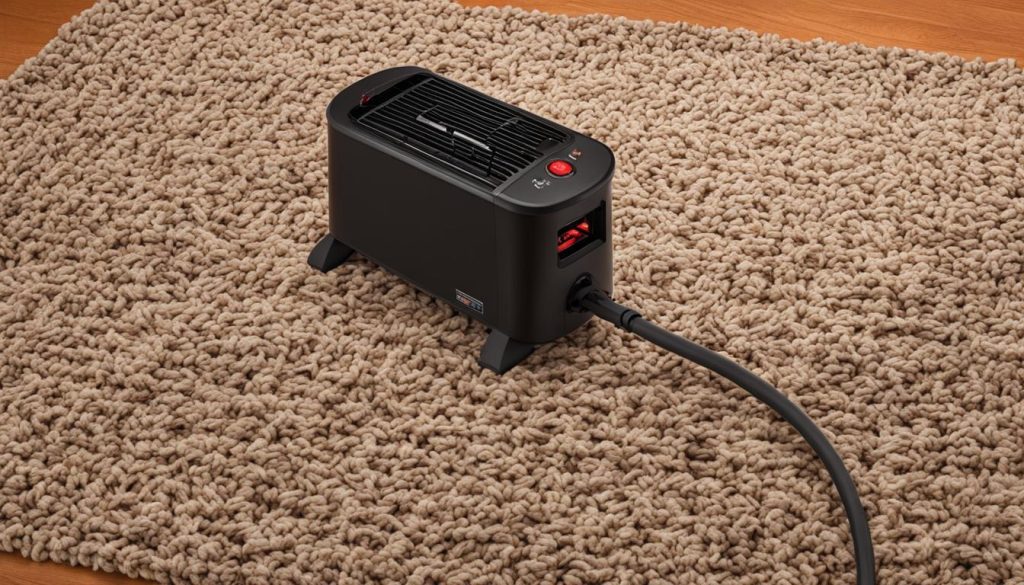
| Extension Cord Type | Rating (Gauge/ AWG) | Recommended Use |
|---|---|---|
| Heavy-Duty Extension Cord | 14 or #12 AWG | Space heaters with high wattage requirements |
| Standard Extension Cord | #16 or #18 AWG | Low wattage devices and appliances |
Additional Safety Tips for Space Heaters
In addition to using the appropriate extension cord, there are other safety tips to keep in mind when using a space heater. By following these guidelines, you can ensure the safe and efficient operation of your space heater.
1. Proper Placement
Keep the space heater on a flat, level surface, away from any combustible materials. It is crucial to maintain a minimum distance of 3 feet between the heater and anything that can burn. This includes furniture, curtains, bedding, and rugs.
2. Never Leave Unattended
Always remember to turn off your space heater when you leave the room or go to bed. Leaving a heater unattended can pose a fire risk. It is recommended to unplug the heater as an extra precaution.
3. Avoid Misuse
Do not use space heaters to warm bedding, cook food, dry clothing, or thaw pipes. These heaters are designed for supplemental heat and should not be used for any other purpose. Always follow the manufacturer’s instructions and warning labels to ensure safe usage.
4. Regular Inspection
Inspect your space heater regularly for any cracked or broken parts. Faulty heaters can pose a safety hazard and should not be used. If you notice any damage, discontinue use immediately and seek professional assistance or consider replacing the heater.
5. Prevent Tripping Hazards
Proper placement of space heaters is crucial to avoid tripping hazards. Never place heaters on cabinets, tables, furniture, or carpets that can overheat and start a fire. Ensure that the heater is positioned securely to prevent accidental tipping.
By following these additional safety tips, you can create a safe environment for using your space heater and minimize the risk of accidents or fires.
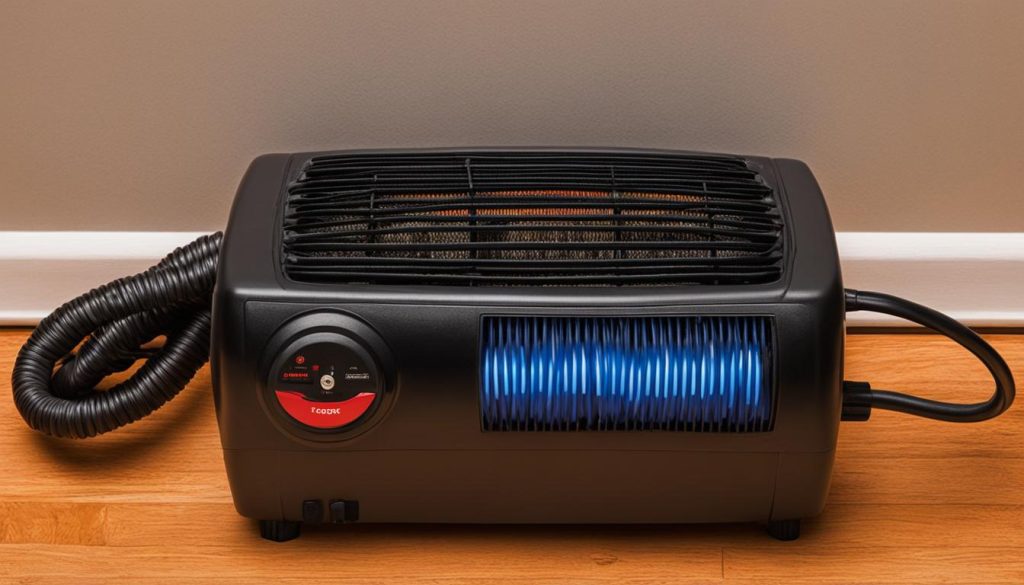
Importance of Electrical Cord Safety
When it comes to using a space heater, it’s not just about finding the right extension cord. Prioritizing electrical cord safety is crucial to ensure the safe operation of your space heater and prevent potential fire hazards. The Electrical Safety Foundation International (ESFI) provides essential guidelines to follow:
Firstly, avoid using electrical cords for permanent wiring or running them through walls, doorways, ceilings, or floors. This practice can lead to overheating and pose a significant risk. Instead, it is recommended to have additional outlets installed if needed, ensuring that your space heater is plugged directly into a wall outlet.
Secondly, the ESFI discourages using multiple plug outlets that are daisy-chained together. This can overload the outlets and increase the chances of electrical malfunctions. It’s important to distribute the load evenly and not exceed the outlet’s capacity.
Lastly, taking care of damaged cords is crucial. Make sure to store them properly, unplug them when not in use, and replace any worn-out plugs or outlets. This simple maintenance can go a long way in preventing potential fire hazards and ensuring the durability of your electrical cords.
FAQ
What safety guidelines should I follow when using a space heater?
It is crucial to use UL, ETL, or CSA certified space heaters with automatic shut-off features, never leave them unattended, and avoid using them to warm bedding or cook food. Place space heaters at least 3 feet away from flammable materials and plug them directly into a wall outlet to prevent overheating and potential fires.
Can I use an extension cord with my space heater?
The Electrical Safety Foundation International (ESFI) advises against using extension cords because they can overheat and pose a fire risk. However, if you must use an extension cord, choose one with a high enough wattage rating to handle the power load of your space heater, marked with a gauge of 14 or #12 AWG. Avoid using cords marked with #16 or #18 AWG, as they may not be suitable for space heaters, and only use extension cords approved by independent testing laboratories such as UL or ETL.
How should I use and maintain my extension cord for safe space heater operation?
Never overload an extension cord or run it through water, snow, or areas where it can get damaged. Inspect cords for signs of wear or damage before each use, and if frayed, worn, or damaged, do not use them. Always plug the extension cord directly into a wall outlet and match the wattage rating of your space heater. Unplug the cord when not in use and store it indoors to prevent damage.
Are there any additional safety tips for using a space heater?
Yes, keep the heater on a flat, level surface at least 3 feet away from anything that can burn. Never leave a space heater unattended and turn it off when leaving the room or going to bed. Avoid using space heaters for tasks such as warming bedding, cooking, drying clothing, or thawing pipes. Follow the manufacturer’s instructions and warning labels, inspect the heater for cracked or broken parts, and never place space heaters on cabinets, tables, furniture, or carpets that can overheat and start a fire.
Why is electrical cord safety important?
Electrical cord safety is essential to prevent fire hazards. It is recommended to avoid using electrical cords for permanent wiring and running them through walls, doorways, ceilings, or floors. Do not use multiple plug outlets that are daisy-chained together, and always plug appliances directly into a wall outlet. Avoid overloading electrical outlets and replace damaged cords, plugs, or outlets promptly to ensure safe operation.
